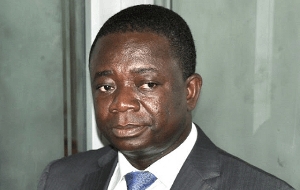Regional News of Saturday, 5 April 2008
Source: GNA
Ashanti GNECC holds Quarterly Meeting
Kumasi, April 5, GNA - The Ashanti Regional Chapter of Ghana National Education Campaign Coalition (GNECC) on Friday held its quarterly meeting at the Asawasi Community Centre in Kumasi. The meeting discussed the regional re-appraisal exercise, the various district activities from January to November last year as well as its first quarter work plan for this year.
Addressing the meeting, Mr. John Kwadwo Owusu, Regional Coordinator, said efforts were being made by the leadership to find new donors to replace withdrawn services.
He said late releases and lack of funds continued to be major constraints confronting the Coalition but assured that efforts were being made to remedy the situation.
Presenting a paper on Teacher-People Ratio, Teacher Deployment and Assault on Teacher in the Ashanti Region, Mr. Peter Appiah Amankwah, Head of Human Resource, Management and Development at the Regional Education Office, observed that teachers were in short supply in the region.
He said the region's Pupil Teacher Ratio stood at 30:1 for primary and a little above average for senior high school of 1:23. He held that teachers were in short supply because some were on leave while others had been seconded to organizations. "Pension, deaths, resignation and vacation of post to travel abroad have also attributed to the shortage of teachers in the region," Mr. Amankwah said.
He noted that cases of assault on teachers were rampant and attributed the situation to reported caning, sexual harassment and relations with students and ladies in the communities by male teachers. Mr Amankwah called on school management committees, District Directors of Education and other stakeholders to help solve the problem. He said the Education Directorate was committed to quality education and, therefore, appealed to Parent Teacher Associations not only to provide accommodation for teachers but also provide incentives to motivate them.
He advised that they should display ownership tendencies towards school issues at all times and also pay them periodic visits.










